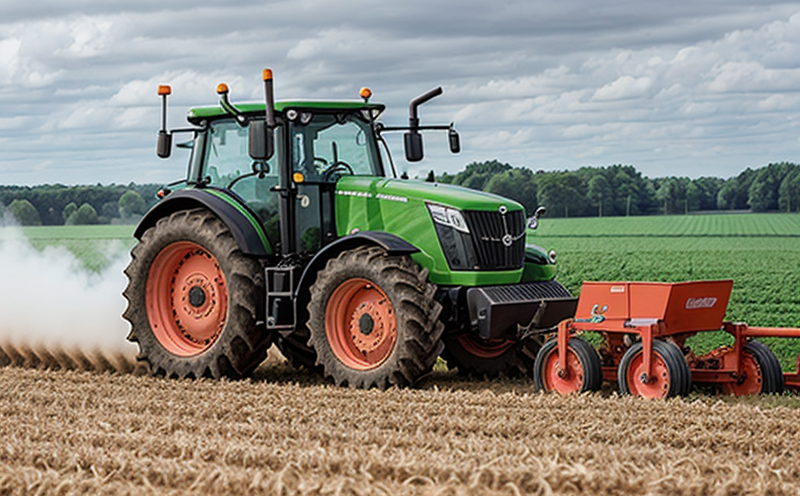Silage Compactor Efficiency Testing
The testing of silage compactors is a crucial aspect within the broader context of agricultural machinery and equipment quality assurance. This service ensures that the compaction process adheres to industry standards, thereby enhancing the efficiency and effectiveness of on-farm storage practices. Proper silage compaction is essential for preserving feed quality during storage, reducing spoilage, and improving livestock health by maximizing nutrient retention.
The testing procedure involves subjecting a silage sample to simulated compaction conditions that mimic real-world farm operations. This allows us to evaluate the performance of various compactor models under controlled environments. The test aims at understanding how effectively each model can achieve optimal moisture content, density, and air exclusion within the silage mass.
Our laboratory utilizes advanced equipment such as pressure sensors, moisture analyzers, and temperature probes to measure key parameters during the compression process. These tools provide precise data on energy consumption, compaction rate, and overall efficiency of different machines. By comparing these metrics against established international standards like ISO 16378:2005 or ASTM D4894-15, we can determine which models perform best in terms of operational effectiveness.
One of the critical aspects of this testing is ensuring uniform compaction throughout the entire silage mass. Uneven distribution leads to increased risk of spoilage and nutrient loss, negatively impacting both feed quality and animal productivity. Our tests focus on achieving consistent density across all layers of the compacted material, which is especially important for large-scale operations where even minor variations could lead to significant economic losses.
Another key consideration in silage compactor efficiency testing is energy consumption. High-efficiency machines not only save costs but also contribute positively towards sustainability goals by reducing fuel usage and associated emissions. Our tests include detailed analysis of power requirements, which helps operators select the most cost-effective solutions for their needs.
In summary, silage compactor efficiency testing plays a vital role in optimizing agricultural practices by enhancing feed quality while minimizing environmental impact. Through rigorous evaluation using state-of-the-art equipment and adherence to relevant international standards, we provide valuable insights into choosing the right compaction technology for any farming operation.
Why It Matters
The importance of silage compactor efficiency cannot be overstated in modern agriculture. Properly compacted silage ensures better preservation of nutrients and reduces feed costs, contributing significantly to overall farm profitability. Efficient compaction also helps prevent wastage due to spoilage, which is particularly critical for large-scale dairy farms or those dealing with significant volumes of harvested crops.
From a sustainability perspective, efficient machines contribute less waste into landfills and promote healthier animals by providing consistent feed quality. This aligns perfectly with global trends towards more sustainable agricultural practices. By investing in high-efficiency compactors, farmers can reduce their carbon footprint while simultaneously improving productivity.
Furthermore, selecting the appropriate compactor based on specific operational requirements is essential for achieving maximum benefits from this investment. Factors such as field size, type of crops being handled, and desired storage duration all play important roles in determining which model will suit best. Our testing services help clients make informed decisions by providing detailed comparative data.
Ultimately, silage compactor efficiency testing supports better decision-making regarding equipment purchases and maintenance schedules. It enables operators to identify potential issues early on, leading to extended machine life and reduced downtime. Additionally, it fosters continuous improvement within the industry by promoting innovation through competitive benchmarking against established standards.
Scope and Methodology
| Parameter | Description |
|---|---|
| Sample Preparation | Corn silage samples are prepared according to ISO 16378:2005, ensuring homogeneity and representativeness. |
| Compaction Conditions | The compactor operates under conditions simulating typical field use, including speed settings and pressure levels. |
| Moisture Content | Immediate post-compaction moisture content is measured using a gravimetric method (ASTM D4894-15). |
| Density Measurement | Density readings are taken both before and after compaction to assess changes in packing density. |
| Air Exclusion | The extent of air exclusion is evaluated by measuring oxygen concentration within the compacted mass. |
| Energy Consumption | Total energy consumed during the compaction cycle is recorded and analyzed. |
The testing process begins with selecting appropriate corn silage samples that represent typical field conditions. Once prepared, these samples undergo compaction according to specified protocols designed to replicate actual usage scenarios. Key measurements include changes in moisture content, packing density, air exclusion efficiency, and energy consumption.
Post-testing analysis involves comparing the results against industry benchmarks set forth by organizations such as ISO 16378:2005 or ASTM D4894-15 to ensure compliance with recognized standards. This comparative approach helps identify any deviations from expected performance levels, allowing for targeted improvements where necessary.
Our team of experts ensures that every aspect of the testing process adheres strictly to best practices outlined in relevant international guidelines. By doing so, we provide clients with reliable data and actionable insights they need to make well-informed decisions about their equipment investments.
Benefits
- Improved Feed Quality: Consistent compaction reduces spoilage and preserves essential nutrients, leading to healthier livestock.
- Economic Savings: Efficient machines reduce feed costs by minimizing waste due to improper storage conditions.
- Sustainability: Lower energy consumption translates into reduced greenhouse gas emissions and a smaller carbon footprint.
- Precise Performance Data: Detailed measurements allow operators to fine-tune their compaction settings for optimal results.
- Enhanced Decision-Making: Comparative testing provides clear guidelines on choosing the best-suited equipment based on specific operational needs.
- Extended Equipment Life: Regular performance checks help detect and address potential issues before they become major problems, extending machine lifespan.
The comprehensive nature of our silage compactor efficiency testing ensures that clients receive thorough evaluations tailored to their unique requirements. This approach not only supports better decision-making but also fosters continuous improvement within the industry through rigorous benchmarking against established standards.





